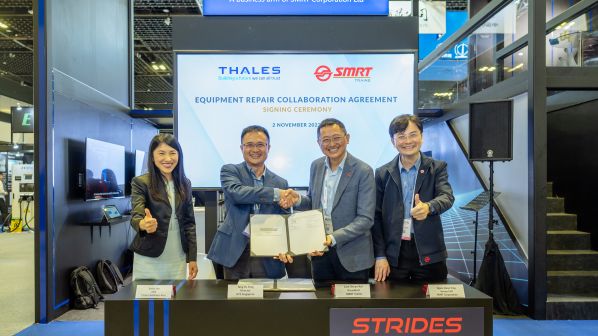SINGAPOREAN public transport group SMRT and its subsidiary Strides International signed several notable memorandums of understanding (MoU) with technology and transport equipment suppliers at the Fourth LTA-UITP Singapore International Transport Congress and Exhibition (SITCE) held in Singapore.
SMRT Trains and Thales signed two agreements. The first is for the joint establishment of a local railway signalling repair facility at the operator’s depot in Bishan to support the Thales SelTrac CBTC system used on the North-South and East-West lines (NSEWL) of the Singapore metro network, which are operated by SMRT.
Circuit boards used by the signalling system are produced and supplied from Thales’ facilities in France and Canada. SMRT Trains president, Mr Lam Sheau Kai, says relocating this to Singapore will reduce turnaround times and costs. “SMRT Trains is continuously looking at ways to enhance the safety, reliability and productivity of our rail maintenance regimes,” he says.
Secondly, SMRT will collaborate with Thales to jointly develop an intelligent rail analytics platform for the smart monitoring of signalling systems, which the partners say will improve the reliability of Singapore’s oldest metro lines.
Built on Thales’ Urban Rail Signalling-Rail Analytics platform, the tailored platform will leverage condition monitoring devices, data analytics and cloud computing to automate the analysis of the signalling system’s performance and condition, and to identify and address potential maintenance issues before they occur, helping to better manage engineering resources while improving overall reliability and performance. SMRT and Thales will work to define specific use cases and identify key maintenance priorities during a series of design workshops.
“The use of digital technologies to pre-empt maintenance issues is also a key strategy for SMRT Trains as we strive to provide smooth journeys for commuters,” Lam says.
The two announcements follow confirmation of the Green CBTC project at InnoTrans in September. Under this initiative the two parties are working to reduce electricity consumption and the traction energy efficiency of the NSEWL.
Alstom
SMRT and Alston signed an agreement committing the partners to explore the use of technology, including 3D printing of replacement components, autonomous robots, and vision computing for predictive maintenance automation, and recovering energy from braking.
The partners say the agreement will harness SMRT’s extensive local knowledge of rail network operations and Alstom’s global research and development resources. This will see teams from Alstom’s Innovation Station located in Singapore and SMRT leveraging the latest technologies in additive manufacturing, data analytics, artificial intelligence and cybersecurity as well as existing infrastructure such as CBTC simulation facilities to optimise the efficiency and security of rail operations and maintenance.
“With SMRT’s experience in operating and maintaining train networks and Alstom’s R&D expertise, we are confident that this collaboration will enhance productivity, cybersecurity and sustainability,” Lam says.
Egis Rail
Strengthening collaboration on cybersecurity is also at the heart of an MoU signed by Strides International and Egis Rail. The partners plan to enhance their cooperation to support consultancy on cybersecurity for rail operators around the world. “This partnership with Egis will assist our customers to fast-track the adoption of industry standards and to become even more cybersecure,” says Mr Lee Ling Wee, president of Strides International.
A*STAR
SMRT also confirmed the signing of a Master Research Collaboration Agreement with Singapore’s Agency for Science, Technology and Research (A*Star) on research and co-innovation projects that will include work on AI, intelligent automation, and data analytics. The agreement runs until 2025.
Areas for exploration include productivity enhancements for the reliability, availability, maintainability and safety (Rams) of transport systems, safety enhancements to benefit staff and human factors management, and sustainability improvements that will benefit operations and maintenance.
One potential project highlighted by the partners is the development of a condition-based monitoring system to improve diagnostic inspections of the waveguide used for SMRT signalling. Inspection and maintenance of the waveguide is a labour-intensive process that can only be undertaken at night. A condition-monitoring system could reduce the estimated 380 nights and 6800 man-hours required to monitor the entire Singapore metro network.
Another project under consideration seeks to use technologies to enhance station operation, including more effective monitoring of intrusion, unusual behaviour, potential hazards and suspicious objects.
“A*Star has deep research strengths that are useful for a public transport operator like SMRT,” says Mr Tan Pengenna Kuan, president of SMRT Engineering. “Our collaboration with A*Star will help us to continue building capabilities for the reliability, safety and productivity of our operations and maintenance.”
Finally, SMRT Trains and East Japan Railway (JR East) signed an MoU promising to exchange best practices on rail operation, customer service, safety, and maintenance to leverage each other’s strengths within Singapore and Japan, respectively. Both companies will collaborate on future technological developments and cross-border business opportunities.

